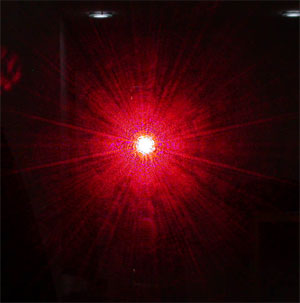7 Kickass Sci-Fi Cancer Cures
Curing cancer is the Holy Grail of modern medicine, and by that we mean researchers will try anything to get it. Anything.
So what happens when all of the top medical scientists focus their brain power and research cash on a single crusade? You get some of the most mind-blowing and downright bizarre tumor-killing methods imaginable. Like: Laser Blasting

Amazing fact number one: A man was strapped to a bed in France, had a three millimeter hole drilled in his head and laser beams were fired into his brain while he was still conscious. Amazing fact number two: he was not James Bond.

Surgeons at Pitie-Salpetriere have clearly decided that months of medication and treatments are for wimps, and have gone all Buck Rogers on tumors instead.

This super-cool laser (literally - the laser fiber optics are chilled so that they don't trigger fits, blood clots or set fire to your living brain) has now been stalled because the developers lack the three million dollars in funding needed to continue to the next stage, which, we assume, would involve striking a patient's heart with lightning, or pouring magic down his throat.
6 (tie) Blowing Up Gold

Apparently, there are some places you can't just administer direct laser death (though, since the previous guys proved that the brain isn't off limits, we can't imagine where that could be). And if you can't shove a precise fiber optic in there, lasers tend to effect you less like a patient and more like an Imperial Stormtrooper (complete with the implied falling down and death).
Unless you've been injected with gold.

Impervious to lasers and cancer.
In another plot clearly lifted from members off of MI6's Most-Wanted list, scientists at MIT have worked out that if you inject tiny gold rods into tumors you can blow them away. The micro-jewellery strongly absorbs infrared laser beams, which can be passed through the body and focused on the maBLINGnant growth. At which point all the things movies have taught you about lasers and flesh become true.
6 (tie) Diamond Patches

Also deserving mention in the "making useless shiny stuff actually useful" trend, scientists at Northwestern University, Chicago, are developing an artificial diamond patch which can release cancer-killing chemicals. These will be implanted into the sites of anti-tumor surgery, erecting giant chemical "And Stay Out!" signs which can prevent any fragments of the original tumor pulling a Voorhees and launching "Cancer II: The Relapsing."
We've been able to make artificial diamonds since the 50s, but the jewelry trade has survived by telling people that the natural stones are much better.

Because if there's anyone we can trust to tell us about natural diamond quality, it's the people who make millions of dollars selling them. But the new medical diamonds are manufactured by nanotechnology, which will eventually make diamonds so commonplace it'll be used as a building material. And while we're looking forward to seeing "De Beers Home Glazing Company," so far the nanodiamonds can't be hooked together into large structures. Still, curing cancer is a pretty good job for a prototype.

You end up with diamonds coated with drugs which can be shoved inside the body. Finally, a way to treat rappers with cancer.
Tumor Terminator

Maryland engineers are building a hunting/killing machine that tracks down breast malignancies, perhaps by taking a photo of a tumor and writing "Sarah Connor" underneath it in marker. The robot is built to live inside Magnetic Resonance Imaging (MRI) systems and will bring swift electric death to what ails you. Replacing the inefficient human model of "Detect tumor, months of tests, more months of treatment, try not to die" with more of a:

The thing literally springs out of the MRI, a metal tube that you're strapped down and inserted into, and starts cutting into you to get at the tumor. Thereby becoming simultaneously the best and worst thing ever to happen to the patient. As a surgical robot it's obviously waterproof, and to work inside the MRI the thing is also completely immune to magnetic fields.

It's like a giant robot coffin that we've made self-aware and armed with spinning blades.
So we better just hope the thing never decides to kill us because we'll have no way to stop it. But what are the chances of a soulless, implacable, logical cutting machine thinking "I must destroy cancer, and cancer lives in humans, so therefore..."
Secret Agent Bacteria

When chemotherapy or radiotherapy don't work, why not turn to some nice friendly Clostridia bacteria? Because the family Clostridia includes things like botulism and tetanus? You pansy. It turns out that some Clostridia don't actually lock your jaw shut then make you try to throw up through it, and only grow in low-oxygen environments. Like the clumps of dead cells in a big tumor.

These cellular secret agents can sneak into the heart of clumps of cancer cells, start replicating and can deploy a pre-installed genetic payload which generally ruins the tumor's whole entire day. The bacteria then presumably stroll out of the exploding tumor to bang the hot bacterial babe it met earlier in the film. They certainly aren't immediately killed by big doses of antibiotics (that's no way to end a movie).
Genetic Cancer Proofing

Prevention is better than a cure, and if that prevention means ungodly tinkering with the very genetic code of life then all the better! University of Kentucky researchers have identified a gene which pretty much cancer-proofs mice, making them resistant to even "highly aggressive" types of tumors. Exactly how they tested this is unclear, but we suspect it involves thousands of very tiny cigarettes and mice squeaking about how they're definitely quitting this time.

We're not sure why they decided to cancer-proof mice first, but we suspect it's to make up for the generally crappy things scientists do to mice: sticking them in mazes all the time, cutting them open to see what's inside and trying pretty aggressively to give them cancer. The "Par-4" gene responsible is passed on by mice to their offspring and has also been found to extend their lives. At this point we'd like to point out that attempts to similarly improve humans are strictly banned.

Fuck humans.
Maybe it's because, from the beginning, the scientists behind this test were only interested in helping mice avoid cancer, or maybe it's because the people in charge are pussies and apparently think a good solid dose of cancer is character-building.
Radioactive Scorpion Venom

If you didn't expect the cure to one of mankind's greatest ills to come from the Israeli Desert Scorpion (also known as the "Deathstalker") raise your hand. If you did, shut up you lying prick. A group of scientists who, evidently, graduated from the Marvel School of Medicine have decided that radioactive scorpion venom will probably cure cancer. The possibility of death and the even greater possibility of the creation of an unstoppable super army of scorpion men is, apparently, a chance we'll just have to take.

The scientists in question took the neurotoxic chemical cocktail from That Which Stalks Death and irradiated it themselves, undoubtedly as preparation for the most epic "I dare you to drink this" in history. Working at the awesomely named "Transmolecular Corporation" in Massachusetts, they found one of the few ingredients in the venom which doesn't kill you.

Instead it binds to cancer cells, presumably on the grounds that if it's come all this way it's going to kill something. If scientists just happen to have made those molecules radioactive, any malignant cells in your body will suddenly find themselves being irradiated to death.
Or, if Marvel is any indication, it'll be, you know, that unstoppable super army thing.
Anti-Cancer Beer

You may remember your college days as being filled with beer and, well, not remember much else (those facts might be related). In what could possibly be the greatest food-medicine crossover since we started developing a candy bar that also makes your penis larger, some Rice University students in Texas are working on a beer that battles cancer and heart disease. While their "Cancer Beer" may not be as marketable as our new Reese's Penis Better Cups, (coming soon!), it's probably slightly more useful in the grand scheme of things.

The "BioBeer" is genetically designed to contain cancer-combating chemical resveratrol. While any tins of the actual brew are still a long way off, as you may have noticed from the lack of "Nobel Prize Awarded to College Students" headlines, the team is currently engineering the special yeast strain which will produce both resveratrol and ferment sweet, sweet booze. The end result will fight cancer, reduce the risk of heart disease and, most importantly, get you drunk. For a social group who stereotypically don't believe in heaven, scientists sure are working hard to get us there.

To Science!
Now that you're feeling warm and fuzzy about science, check out how it's going to destroy us in The 5 Scientific Experiments Most Likely to End the World. Or find out Why You Don't Steal From Cracked.com.
You can read more of Luke McKinney's stuff at LukeMcKinney.org.





